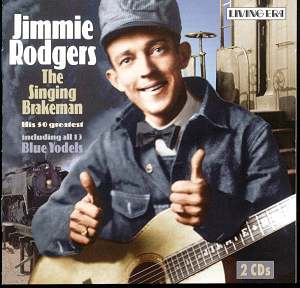1. Brakeman's Blues (Yodeling The Blues Away)
2. Soldier's Sweetheart
3. Sleep Baby Sleep
4. Ben Dewerry's Final Run
5. Blue Yodel No 1 (T For Texas)
6. Sailor's Plea
7. In The Jailhouse Now
8. Blue Yodel No 2 (My Lovin' Gal Lucille)
9. Blue Yodel No 3 (Evening Sun Yodel)
10. My Old Pal
11. My Little Old Home Down In New Orleans
12. My Little Lady
13. Never No Mo' Blues
14. Blue Yodel No 4 (California Blues)
15. Waiting For A Train
16. Any Old A Train
17. Blue Yodel No 5
18. Tuck Away My Lonesome Blues
19. Train Whistle Blues
20. Jimmie's Texas Blues
21. Frankie And Johnny
22. Blue Yodel No 6
23. Yodeling Cowboy
24. My Rough And Rowdy Ways
25. Hobo Bill's Last Ride
Disc: 2
1. Mississippi River Blues
2. Blue Yodel No 7 (Anniversary Blue Yodel)
3. Blue Yodel No 11
4. Pistol Packin' Papa
5. Those Gambler's Blues
6. Blue Yodel No 8 (Mule Skinner Blues)
7. Blue Yodel No 9 (Standing On The Corner)
8. TB Blues
9. Travellin' Blues
10. Jimmie The Kid
11. Wonderful City
12. Let Me Be Your Sidetrack
13. When The Cactus Is In Bloom (Round Up
Time Out West)
14. Looking For A New Mama
15. My Good Gal's Gone
16. Roll Along Kentucky Moon
17. Blue Yodel No 10 (Ground Hog Rootin' In
My Back Yard)
18. No Hard Times
19. Peach Pickin' Time In Georgia
20. Gambling Bar Room Blues
21. Blue Yodel No 12 (Barefoot Blues)
22. Blue Yodel No 13 (Women Made A Fool Out
Of Me)
23. Mississippi Delta Blues
24. Somewhere Down Below The Mason Dixie Line
25. Years Ago (Fifteen Years Ago Today)
Jimmie Rodgers (vocal and guitar) with various
accompaniments
Recorded 1927-33
I’ve not been scrupulous
in fine tooth combing Rodgers’s discography
but we have here getting on for half of his
commercially released recordings; fifty sides
out of one hundred plus that he bequeathed
to posterity. The number seems surprisingly
small in view of his eminence in the Country
world but then TB did for Rodgers at thirty-six
in 1933. And he’d only been recording for
a scant six years.
It was a bit of a jolt to
see that the sleeve note writer was Digby
Fairweather, the British cornet player. But
then Rodgers has always had a place in jazz
lovers’s hearts. He was certainly versed in
the blues, elements of which he picked up
during his itinerant days, and he sang adaptations
of things like St James Infirmary but
it was his unlikely 1930 Los Angeles meeting
with Louis Armstrong that has endeared him
to jazzers – their Blue Yodel No.9 (Standing
On The Corner) features Armstrong’s blues-drenched
obbligato and his wife Lil’s more genteel
parlour piano.
Ballads, songs of the War
and lost loved ones, sentimental songs about
hearth and home, kith and kin, these were
some of the staples of Rodgers repertoire.
But there were also hobo ballads, and useful
elaborations on such familiar titles as Casey
Jones – which is what Ben Dewerry's
Final Run is. There are lyrics that you
will have heard elsewhere – either because
they were already part of the current of popular
song or because you’ll have heard Jack Teagarden
or Jelly Roll Morton sing them (try Blue
Yodel No 1 (T For Texas) – very appropriate
for the Texan Teagarden. Plenty of muddy water
and Mississippi wine.
It’s true that the rhythmic
patterns are rather repetitious, and that
the characteristic Rodgers yodelling is so
omnipresent as to become stifling, but these
were his stylistic prints. He absorbed lines
from the St Louis Blues in Blue
Yodel No 3 (Evening Sun Yodel) Both Those
Gambler's Blues and Gambling Bar Room
Blues are in reality St James Infirmary.
In fact for one of the founding fathers
of Country music it’s remarkable just how
many Blues he sang, albeit his was a very
different kind to the Classic or Country Blues.
Something of his affiliations can be sensed
in the band accompaniment, essentially a jazz
group line up, on a couple of tracks.
His greatest numbers are
here, all the Blue Yodels (not to be sampled
in one sitting), Waiting For A Train
(unforgettably done), and the maudlin poetics
of Hobo Bill's Last Ride.
Other than that Fairweather’s
notes are concise and well written, as one
would expect of a librarian-scholar-cornetist,
and sound quality is good. This is a fine
selection and my only complaint is that I
wish that Living Era hadn’t given any more
publicity to Joel Whitburn’s ridiculous "Chart
positions" propounded in his book Pop
Memories 1890-1954. That’s one labour
of love too crazy to take seriously. There
were no charts and it’s foolish in
the extreme to extrapolate that you can invent
them.
That out of the way, this
series has been producing the goods recently
and this is no exception.
Jonathan Woolf
